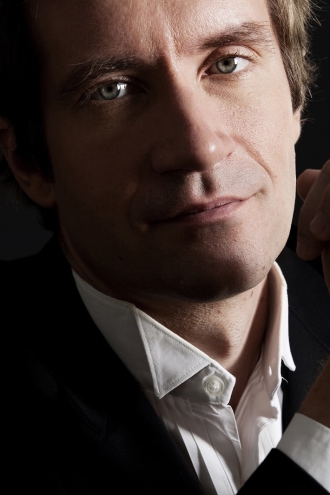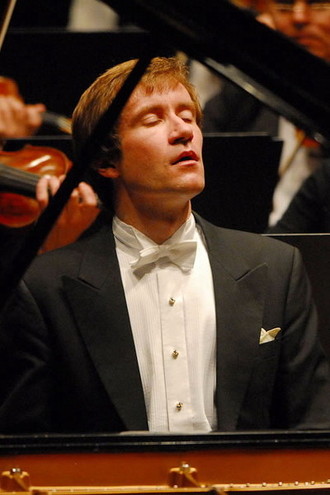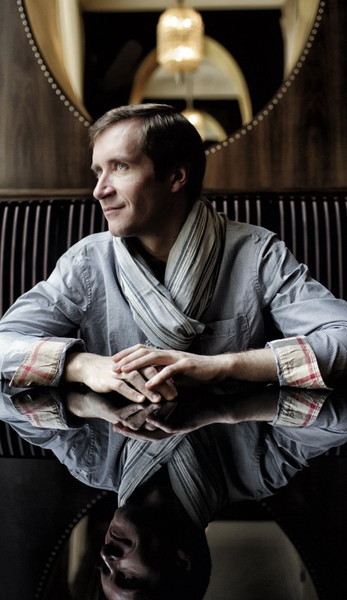
Profile of Pianist Nikolai Lugansky
by Peter Schlueer, Klassik Heute Magazine
Poet and Virtuoso
Two years ago, in a supremely transparent interpretation of Chopin's Etudes, Nikolai Lugansky offered impressive evidence of his ability to present virtuoso pieces with undemonstrative ease, yet full of poetic meaning. Even before his victory in the 10th International Tchaikovsky Competition in Moscow, he was already earning his place among the elite of the younger generation of pianists with impressive recordings of Rachmaninoff and successful debuts in Europe, South America and the Far East. And now a new recording of works by Chopin has been issued, his fourth with the French label Erato.
However, it is not only Chopin and Rachmaninoff that the young Russian is able to play with sensitive brilliance: he has already approached works by the German Romantics with astonishing sensitivity, as his reading of Robert Schumann's Symphonic Etudes, in particular, demonstrates: The soft delicacy with which he plays the final posthumous variation, in which shimmering harmonies descend from high F with angelic tenderness, bears witness to his understanding of a psychological dimension which Germans and non-Germans both call, for want of a really accurate translation, "Innigkeit" [sincerity, intimacy]: a concept inseparable from Beethoven's Sonata in E major, op. 109, composed in 1820, whose concluding set of variations carries the expressive direction 'Gesangvoll, mit innigster Empfindung' (songfully, with the greatest 'Innigkeit' of feeling') and in many respects looks forward to the world of Schumann.
This sense of Innigkeit is combined in Lugansky's playing with a graceful, elegant brand of virtuosity, one which is supported by stupendous technical reserves and yet has little in common with Russian pianistic heroics as generally conceived. It allows him to give full voice to Florestan, the tempestuous half of Schumann's psyche, or to dash through the Toccata op. 7 with lightly sprung élan. To this seemingly effortless virtuosity one must add, as with all really exceptional instrumentalists, an incredible capacity for absorbing unfamiliar works, of which I will say more later. This allows him, even at short notice, to programme works which tend to be avoided because they are both harder for the player and less effective with the public. In Tchaikovsky's Piano Concerto No. 2, for example: anyone who fails to take the bull by the horns and proceed at a bold pace will inevitably sink in the seething chords of the gigantic cadenza that takes place during the development of the first movement. On his recent tour with the Moscow Philharmonic under Yuri Simonov, Lugansky used his fleet technique to shape the discursive longueurs of this work, which can seem endless in less capable hands, into clearly articulated musical arches that gave it musical coherence and clarity of outline.
Married and the father of two children, Lugansky, for all his powers of musical persuasion, still conveys onstage something of the gawky youth that smiled from his earliest CD covers for Vanguard Classics. This was in particularly striking contrast to the solid build of Maestro Simonov, who used extrovert, martial gestures to encourage his orchestra to play with tonal opulence and big-boned expression, and after the interval gave a seductive dance on the podium in Rimsky-Korsakov's symphonic suite Scheherazade, sparking gestural fireworks a la Jack Nicholson, to the audience's delight. Lugansky, who joined the audience after his pianistic tour de force, hardly seemed to notice this theatrical and, in its own way, brilliant conductorial ballet: totally focused on the music, all the while he looked to one side, serious and lost in thought. Only after the flowers were presented, when, as always, the applause faltered for an instant (as if the audience were afraid of the bouquet being dropped), and Yuri Simonov, ever the comedian, stuck his baton resolutely among the flowers and left them on the podium for all to see their decorative effect, only then did Lugansky also begin to smile.
Terrifying Whirlwinds
The composer closest to Lugansky's heart would probably not have smiled at all at such foolery. It was with Sergei Rachmaninoff's complete Etudes-Tableaux that the 19 year-old Lugansky made his recording debut with Vanguard Classics. (Two recordings had already been issued by Melodiya.) Here there is, as yet, little evidence of the transparent, graceful elegance which would become the hallmark of Lugansky's playing, beginning with his very next CD, also dedicated exclusively to works of Rachmaninoff. On this first Vanguard recording he traces Rachmaninoff's darkly shimmering tone paintings with virtuoso abandon, even risking harshness of tone. The CD's liner notes, written by Lugansky himself, show a degree of intellectual penetration of their subject matter which is rarely encountered in a young virtuoso. He quotes Russian poets such as Tyutchev, Blok and Pushkin, makes mention of Bunin's prose or the "terrifying whirlwinds from Dante's Inferno" by way of illustration, alerts us to important musical symbols such as the constantly recurring motif of bells - but also allows youthful free reign to his own imagination.
In part, Lugansky surely owes this intellectual bent to the to the fostering influence of his teacher Tatjana Nikolayeva, an influence which always went beyond purely pianistic or even musical limits. For her entire life, as a judge for major competitions, Nikolayeva was in search of new talents and, in an interview shortly before her death, she called Lugansky "The Next One". She was never to witness his success in the Tenth International Tchaikovsky Competition, held in Moscow in 1994: several months earlier she had died on stage during a concert in San Francisco.
Lugansky's parents, both scientists, discovered their son's gift purely by chance. Even before he was born, his father, though a great opera lover, had vowed never to buy a musical instrument. Under no circumstances would he expose his children to the daily tortures of excessive discipline which he had seen only too often with the offspring of friends and acquaintances. Fate, however, got the better of him.
'One day', Nikolai Lugansky relates, 'my father brought home a one-and-a-half octave toy piano which had fallen into his possession more or less by accident. When he tried to play a popular Soviet song on it, I called over from the next room that he was playing wrong notes, and how it should go.' Lugansky, five years old at the time, had absolute pitch – a phenomenon that his father had up to this point regarded as a rather implausible myth. Without any delay, a music school for children was contacted, and there Lugansky was able to gaze upon a full-size concert grand piano for the first time in his life.
Further happy circumstances would have it that his first teacher was a pupil of the legendary virtuoso Konstantin Igumnov. 'His dacha was right next to ours,' Lugansky remembers, 'and this is how we became acquainted. My parents grew vegetables there; some people, like the family of the girl who is now my wife, even kept pigs, chickens and rabbits in order to survive in the city. Sergei Ipatov - this was the name of my teacher - had spent his childhood and youth in orphanages. For this reason he was only able to begin playing the piano at age 16, which of course prevented him from reaching the top as a pianist. But he was very talented, also as a composer. He earned his living by teaching and by tuning pianos. For most people, life was not easy in the Soviet Union at that time.'
Ipatov referred his pupil to the Central School of Music. There, Lugansky came under the tutelage of Tatjana Kestner, who had studied with the famed Alexander Goldenweiser - whose pupil Grigory Ginsburg, unfortunately not so well known in the West, Lugansky praises to the skies: and not without reason, as one has to admit in the face of the incredible cantabile, the poignantly tender poetry with which this pianist conjures from the keyboard the lingering echo effects in Liszt's transcription of Ständchen from Schubert's song cycle Schwanengesang. The recording has become available once more as part of the Philips Great Pianists of the 20th Century series.
Masses of Records
When Tatjana Kestner died at a great age, Lugansky, age 14, gave his first piano recital in her memory. He continued his studies at the Moscow Conservatory with Tatjana Nikolayeva, another product of the Goldenweiser school. Her career began in 1950 in Leipzig, where she won the the International Bach Competition at age 26. In the first round she already amazed the jury, headed by Dmitri Shostakovich, by announcing that she was prepared to perform not just one Prelude and Fugue from the Well-Tempered Clavier, as required, but any of the 48. She became a Bach interpreter of international renown, and her playing inspired Shostakovich to write his magnum opus for the piano, the Preludes and Fugues op. 87, of which she gave the premiere performance in 1952 in Leningrad.
Lugansky would later become her most talented pupil by far, and encouraging him became her particular concern. In 1988 she showed the 15-year-old's Melodiya recordings to her agents in the West and subsequently took him with her on international concert tours. A professional musical partnership came into being. The two appeared together in duo recitals and in concerti for two pianos by Bach and Mozart. At this time Lugansky also gave his solo debut at the MIDEM in Cannes and won a silver medal at the very same Bach Competition in Leipzig which had launched the career of his teacher.
"Even though she was already 65, and I was only 15, I feel I can say that we were friends. I was often at her home, and together we listened to masses of records. She could never hear enough music and brought new recordings with her from every tour abroad. Her tastes were astonishingly wide. For instance, she had a particular liking for Glenn Gould, even though his conception of Bach was fundamentally at odds with her Romantic approach. At her home I first heard recordings by Horowitz, and she introduced me to the Ravel recordings of Vlado Perlmuter, who was completely unknown in Russia at that time. We also went to concerts or the theatre together, and of course I didn't miss any of her own performances in Moscow. Not just musically, but in human terms she had an immense influence on me, because of her special warm-heartedness. Not many people know that she had a hard life. Widowed early, she took care of not only her son, but also of her brother, who was mentally handicapped. He lived with her and she always lovingly looked after him."
Nikolayeva's method of teaching Lugansky was quite unorthodox. While she gave him musical guidance, technically she left him to find his own way. "This forced me", Lugansky relates, "to start at square one with every piece; with time, I learned to find an individual pattern of gestures for each composer. This means that when I now move from one composer to another in a recital, at that moment I become not only a different musician, but also a different pianist, as it were."
The Constant Factor: Rachmaninoff
Lugansky's quick intelligence amazed even Tatjana Nikolayeva, who was always dealing with top talents. When she gave him Rachmaninoff's 3rd Piano Concerto to learn, a work he had never played before, he memorized it and performed it for her, without a score, three days later. The piano reduction of this concerto, which is peppered with the greatest technical hurdles, takes up a good 78 pages in the Boosey & Hawkes edition.
However, while a capacity for such feats of memory is rare and almost incomprehensible to those of normal talent, among the small handful of top instrumentalists and conductors who jet around the globe it is standard fare. The super-virtuoso Arcadi Volodos likewise learned the Rachmaninoff 3rd Concerto in only a few days. The scores stored in the heads of conductors such as Daniel Barenboim or Lorin Maazel amount to thousands of pages.
Is something of Rachmaninoff's melancholy reflected in Lugansky's own personality? "I think so, otherwise I wouldn't be playing Rachmaninoff. This melancholy is a part of the Russian temperament. It may be connected with the darkness and unlimited expanses of the Russian landscape."
It is not difficult to guess that Lugansky does not have much time for contemporary music. He considers the breakdown of tonality a pathology, rather than a revolution. It follows, then, that for his solo debut CD with the Erato label he made the conservative choice of Chopin's Etudes. A light-fingered, elegant, refreshingly vital reading was the result. The aesthetic and poetic finish of each individual study carried far more weight than the dazzling effect of his flawless technique. And Chopin was also the focus of another Lugansky recording, released in 2002.
After the Chopin Etudes, the following album continued the basic theme of Rachmaninoff with the six Moments Musicaux op. 16 and the ten Preludes op. 23. During the recording sessions in September 2000 Lugansky was said to have given an impromptu performance of the early C sharp minor Prelude (already a hit during Rachmaninoff's lifetime) of "such burning intensity" that an immediate decision was made to include it as a bonus track on the CD. And so we may eagerly anticipate what Lugansky will be offering us: during his German tour with the Moscow Philharmonic he already gave us a taste of the Moments Musicaux in his encores, which leads one to expect – I can tell you this much – things fast and fiery...
Peter Schlueer
LinkedIn





